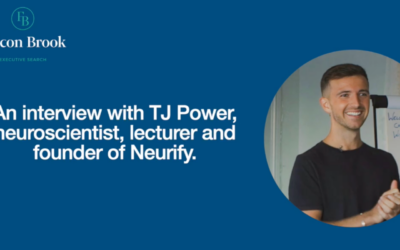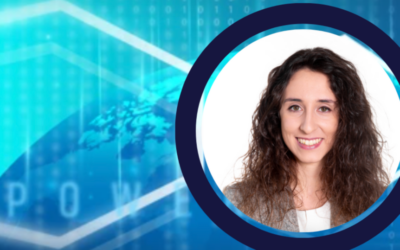Geopolitics is a daily operational factor impacting business strategy for energy professionals and far beyond.
It can also have a personal impact, which can be subtle and hidden.
This was the focus of our conversation with Laura Feleki when we caught up with her to discuss her move to Merkle DACH after almost two decades at Alpiq, one of Switzerland’s largest electricity producers.
“It was a big step to change my job after 18 years and into such a different role,” Laura tells us. “One minute I was in a very male-dominated industry engaging with technical teams working in clearly internal projects.
“The next I’m working with cross-functional teams, drawing on cross-industry experience from pharmaceuticals to retail, automotive and media sector to envision how we can support energy companies as they transform how they engage with customers, digitise and decarbonise.”
Laura’s life is full of big steps and challenges, starting with the reality of life in a communist country.
As an ethnic Hungarian, growing up in Romania meant Laura and her family faced discrimination at every turn.
“You were considered wrong if you were not part of the political apparatus. If you were Jewish, German, Black, Hungarian or a different religion. Or if you were Romanian but intellectual and not a party member, then there was discrimination and a sense that you were being hunted all the time,” Laura continued.
A practical example is how she was treated at school. Based on her marks, she was technically top of her class. However, she was always ranked third because of her parents’ background.
“I was successful in Romania. I was taking part in national maths competitions, I studied economics. But I knew I had to leave Romania to make the most of my life, even after the revolution in 1989,” she continues. “I moved to Switzerland as soon as I finished my degree, taking only what I could fit in a backpack.”
Aware that she needed to start working as quickly as possible, Laura learned to speak German in just three months after moving to Zurich. She then got her first job with her first interview at Alpiq and her career blossomed.
Laura was initially focused on Eastern Europe and emerging markets, trading electricity in CEE and SEE (from Poland to Turkey) and built a team of 35 as front office support. Later she moved to other corporate roles and then worked in IT.
“This was a dynamic time, with renewables and the sustainability agenda driving change. Clean energy ideas were really in the DNA of Alpiq from the beginning. We were buying power plants and then re-engineering them to be more environmentally and safety focused, or we were first movers to partner up to produce and distribute green hydrogen in Switzerland. I could apply maths and people and leadership skills in complex negotiations and projects. There was always something new to learn and I never thought of looking for another company or industry.”
It was Covid, and the additional time available because of working from home, that prompted Laura to consider a change.
Unlike many people, who found lockdown a time of narrowing perspectives, Laura found a way to broaden her horizons.
“During lockdown I discovered that some of the world’s leading universities were offering gorgeous online courses. I signed up for a human computer interaction course at Massachusetts Institute of Technology, a digital business transformation at Berkeley and then a Net Zero for Businesses at Cambridge University on CISL.
Laura found a different conversation and a broad community: “We were talking about how we can drive change, serve people better and increase sustainability by engaging customers differently, digitally and with data.”
When Laura met with Merkle, she realised she could combine her deep knowledge of energy industry with the wide capabilities of Merkle to bring more change.
“What could a customer experience perspective based on data bring to energy users? Digitalisation has made an enormous impact on energy sustainability and efficiency. Drones capture data to support predictive maintenance by engineers, who go out in the field when the data shows a problem.”
At Merkle, Laura’s focus is developing thought leadership and service offering in both decarbonisation and sustainability, combining the range of Merkle capabilities from customer experience, user experience, research, data analytics, consultancy, and all in-house technology practices.
“We’re digitising customer journeys and bringing creativity to help energy companies and other industries to transform their customer relations and drive greater efficiencies.”
Laura reflects on the differences of working with a media company after almost two decades in the energy sector.
“It sometimes surprises people to learn that gender discrimination was not an issue growing up in Romania. Half of our international maths team were women. At high school and university there was an equal gender split in engineering and informatics.”
“When I started my first job, I was the only woman in the business unit collaborating with hundreds of men. Even now, recruiting and retaining women is a continuing theme for energy companies, but it is changing, especially because of the growing number of women CEOs, including at Alpiq, who are changing the culture of energy companies”
Alongside is the issue of the gender pay gap, which many businesses are also struggling to erode, especially as so many women either do not return after parental leave or take smaller roles.
“I did not realise that I might end up earning less because I was a woman. This was not such a visible issue when I started working. When someone finally spotted that I was earning much less than men in my department, my salary was almost doubled overnight.”
Laura’s childhood experiences of life under a repressive totalitarian regime means she approaches work differently.
“When you live in a parallel world where the authorities may be listening to everything anywhere, it creates a fear. It shapes how you think about your rights and expectations. It means you assert yourself differently, and you question your right to express your views.”
“Even when I knew my salary was lower, I was so grateful to be in Switzerland, to have a job, to be free. I knew that what I was already earning was more than my father’s combined annual salary when he was working two jobs to make ends meet. My expectations were so different.”
Having met and worked with many other people who experienced life in a totalitarian state, Laura explains how survivor guilt is a common thread between them.
“It took me 15 years to realise the impact of being born under communism and how that affected me when I was working in teams or working towards shared goals. We were taught to be the best, the strongest. There was a pressure to excel. I know about ambitious standards.
“As oppressed ethnic Hungarians or any other persecuted category of people, we were programmed to always be on spot and excel. It was exhausting, a constant mental pressure. Leaving the country was at the time the only way to establish a normal life.”
Laura concludes with observations on how history continues to repeat itself in Eastern Europe, especially given the conflict in Ukraine.
“Some never learn to be free, some managed and changed their lives. It is nice to see the difference in generations born since the 90s who did not experience the trauma of an authoritarian communist period. It took me a long term to confront that experience and to learn who I am. This is an important lesson as political regimes and discrimination continue to displace people and lead them to build their lives in another country. It creates great diversity, which strengthens communities and teams. But it can leave a legacy from which many do not recover.”



